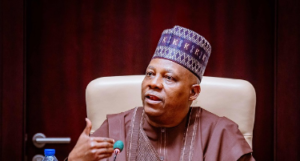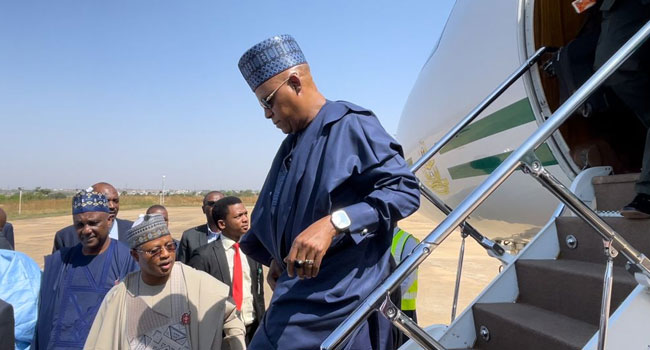Vice President Kashim Shettima recently visited Kaduna to inaugurate the resettlement scheme for victims affected by a military drone attack at Tudun Biri Village in the Igabi Local Government Area. This significant visit underscores the federal government’s commitment to supporting and rehabilitating those impacted by the tragic incident.
Upon his arrival at the Kaduna International Airport on Friday, Shettima was warmly received by Governor Uba Sani, accompanied by other senior government officials. Notable figures present included the Vice President of the National Emergency Management Agency (NEMA) and the Speaker of the Kaduna State House of Assembly, among others. Their presence highlighted the gravity of the occasion and the collective effort of various government bodies in addressing the aftermath of the drone strike.
The drone attack, which occurred on December 3rd, led to a devastating loss of over 100 lives, predominantly children. This tragedy has left an indelible mark on the community of Tudun Biri, necessitating a robust response from the government. The resettlement scheme is a crucial part of the federal government’s promise to provide relief and rebuild the lives of those who suffered in the conflict.
During his visit to Tudun Biri, Vice President Shettima will preside over the groundbreaking ceremony for the construction of new residential houses for the victims. This project marks a significant step in the recovery process, aiming to provide secure and stable housing for those who lost their homes and loved ones in the attack. The initiative is not merely about rebuilding structures but also about restoring hope and a sense of normalcy to a community that has endured profound loss.
 Governor Uba Sani, in his address, emphasized the importance of the resettlement scheme, noting that it symbolizes the government’s dedication to the welfare of its citizens, particularly those affected by such unforeseen tragedies. He acknowledged the coordinated efforts of state and federal agencies in swiftly responding to the needs of the victims and ensuring that the promise of resettlement is fulfilled.
Governor Uba Sani, in his address, emphasized the importance of the resettlement scheme, noting that it symbolizes the government’s dedication to the welfare of its citizens, particularly those affected by such unforeseen tragedies. He acknowledged the coordinated efforts of state and federal agencies in swiftly responding to the needs of the victims and ensuring that the promise of resettlement is fulfilled.
The Vice President’s visit also serves as a testament to the government’s broader strategy of addressing internal conflicts and the repercussions of military operations. By personally overseeing the resettlement scheme, Shettima is reinforcing the message that the government stands with its people in times of crisis, providing not only immediate relief but also long-term solutions for recovery and development.
The resettlement initiative is expected to encompass more than just housing. Plans are likely to include the establishment of essential services such as healthcare facilities, educational institutions, and infrastructure development to support the holistic recovery of the community. The government’s approach aims to create a sustainable environment where the victims can rebuild their lives with dignity and security.
Furthermore, the involvement of NEMA underscores the importance of disaster management and emergency response in mitigating the impact of such incidents. The agency’s role in coordinating relief efforts and ensuring that the victims receive necessary aid highlights the critical function of national agencies in addressing emergencies.
The Vice President’s presence and the groundbreaking ceremony for the new residential houses mark a pivotal moment for the residents of Tudun Biri. It represents a significant stride towards healing and reconstruction, offering a beacon of hope for a better future. The federal government’s support, manifested through this resettlement scheme, aims to mend the wounds of the past and lay the foundation for a resilient and thriving community.
As the construction begins, the eyes of the nation will be on Tudun Biri, watching as the promise of a new beginning takes shape. This initiative is not only a response to a specific tragedy but also a model for how the government can address and mitigate the impacts of conflicts across the country. The success of this resettlement scheme could set a precedent for future efforts in similar contexts, demonstrating a commitment to the welfare and prosperity of all Nigerians, especially those most in need of support and compassion.




